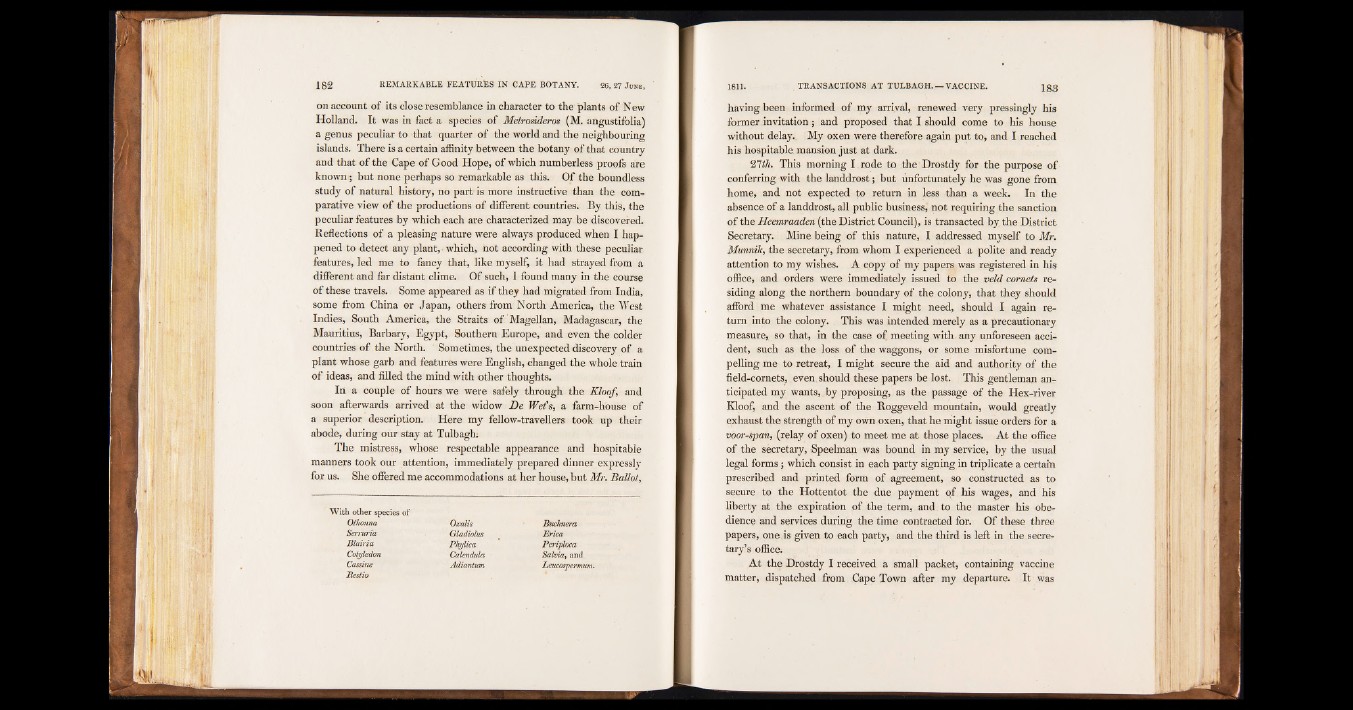
on account of its close resemblance in character to the plants of New
Holland. It was in fact a species of Melrosideros (M. angustifolia)
a genus peculiar to that quarter of the world and the neighbouring
islands. There is a certain affinity between the botany of that country
and that of the Cape of Good Hope, of which numberless proofs are
known; but none perhaps so remarkable as this. Of the boundless
study of natural history, no part is more instructive than the comparative
view of the productions of different countries. By this, the
peculiar features by which each are characterized may be discovered.
Reflections of a pleasing nature were always produced when I happened
to detect any plant, ■ which, hot according with these peculiar
features, led me to fancy that, like myself, it had strayed from a
different and far distant clime. Of such, I found many in the course
of these travels. Some appeared as if they had migrated from India,
some from China or Japan, others from North America, the West
Indies, South America, the Straits of Magellan, Madagascar, the
Mauritius, Barbary, Egypt, Southern Europe, and even the colder
countries of the North. Sometimes, the unexpected discovery of a
plant whose garb and features were English, changed the whole train
of ideas, and filled the mind with other thoughts.
In a couple of hours we were safely through the Kloof, and
soon afterwards arrived at the widow De Wet’s, a farm-house of
a superior description. Here my fellow-travellers took up their
abode, during our stay at Tulbagh;
The mistress, whose respectable appearance and hospitable
manners took our attention, immediately prepared dinner expressly
for us. She offered me accommodations at her house, but Mr. Ballot,
Blairia
Cotyledon
Cassine
Restio
Oxalis
Gladiolus
Phylica
Calendula
Adiantum
Buchner a
Erica
Periploca
Salvia, and
Leucospermum.
having been informed of my arrival, renewed very pressingly his
former invitation ; and proposed that I should come to his house
without delay.. My oxen were therefore again put to, and I reached
his hospitable mansion just at dark.
27th. This morning I rode to the Drostdy for the purpose of
conferring with the landdrost; but unfortunately he was gone from
home, and not expected to return in less than a week. In the
absence.of a landdrost, all public business, not requiring the sanction
of the Heemraaden (the District Council), is transacted by the District
Secretary. Mine being of this nature, I addressed myself to Mr.
Munnik, the secretary, from whom I experienced a polite and ready
attention to my wishes. A copy of my papers was registered in his
office, and orders were immediately issued to the veld comets residing
along the northern boundary of the colony, that they should
afford me whatever assistance I might need, should I again return
into the colony. This was intended merely as a precautionary
measure, so that, in the case of meeting with any unforeseen accident,
such as the loss of the waggons, or some misfortune compelling
me to retreat, I might secure the aid and authority of the
field-cornets, even should these papers be lost. This gentleman anticipated
my wants, by proposing, as the passage of the Hex-river
Kloof, and the ascent of the Roggeveld mountain, would greatly
exhaust the strength of my own oxen, that he might issue orders for a
voor-span, (relay of oxen) to meet me at those places. At the office
of the secretary, Speelman was bound in my service, by the usual
legal forms; which consist in each party signing in triplicate a certain
prescribed and printed form of agreement, so constructed as to
secure to the Hottentot the due payment of his wages, and his
liberty at the expiration of the term, and to the master his obedience
and services during the time contracted for. Of these three
papers, one is given to each party, and the third is left in the secretary’s
office.
At the Drostdy I received a small packet, containing vaccine
matter, dispatched from Cape Town after my departure. It was